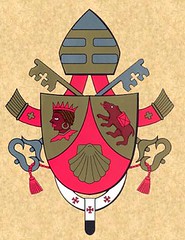The hits are direct, firm, and air tight.
``Europe has developed a culture which, in a way never before known to humanity, excludes God from public conscience, either by being denied or by judging his existence to be uncertain and thus belonging to subjective choices, something irrelevant for public life,'' Benedict writes.The Pope is right on target there. Even an Islamofascist will have some grudging respect for a devout Christian or Jew. Someone that denies God is the lowest of the low for them; they will have nothing for contempt for that person. An Indidel has some status; and Apostate none.
He dismisses arguments that inclusion of the reference would have offended Jews and Muslims, saying they are more offended by Europe's attempt to deny a historic fact.
``It's not the mention of God that offends the followers of other religious, but precisely the attempt to build a human community absolutely without God,'' he writes.
Written before he became Pope, the book provides some insight on why he chose Benedict.
He says Europe needs more people like St. Benedict of Norcia, the fifth and sixth century monk who is a patron saint of Europe. The Benedictine order that followed his teachings became the main guardian of learning and literature in Western Europe during the dark centuries that followed the fall of the Roman Empire.I don't know or read Italian (the language of
It's true that today there exists a new moralism whose key terms are justice, peace, and conservation of creation -- words that recall to us essential moral values of which we truly have a need. But this moralism remains vague and slippery, almost inevitably so, in the sphere of party-politics. Such a moralism is before all else a pretense for others, and too little a personal duty of our daily life. In fact, what does "justice" signify? Who defines it? Of what utility is peace? In recent decades we have seen amply enough in our streets and in our piazzas how pacifism can deviate toward a destructive anarchism and toward terrorism. The political moralism of the 70's, whose roots have not yet died, was a moralism which succeeded to fascinate even those youth filled with idealism. But it was a moralism with the wrong address, inasmuch as it was deprived of serene reasoning and because, in the last analysis, it put a utopian political order above the dignity of the individual man, showing itself capable of arriving, in the name of its grand objectives, to devalue man. Political moralism, as we have seen and as we still experience, does not only fail to open the path to regeneration, but blocks it. The same is true, consequently, of a christianity and of a theology which reduces the core of the message of Jesus, the "Kingdom of God", to "values of the Kingdom", identifying these values with the great terms of the order of political moralism, and proclaiming them, at the same time, as the synthesis of religions;Yep, the Pope is a hundred-pound-head type. Woe be to the Eurocrat that tries to intellectually spar with that man.
This brief look at the situation of the world brings us to reflect upon the present situation of Christendom, and hence also upon the foundations of Europe . . . If Christendom, on one hand, has found its own, most efficacious expression in Europe, one needs to say, on the other hand, that in Europe there has developed a culture which constitutes itself in the most radical manner not only as the contradiction of Christendom, but of the religious and moral traditions of humanity. From this, one understands that Europe is truly and actually undertaking a "driver's test" from which one understands the radicality of the tensions which our continent must confront. But here there emerges also and above all else the responsibility which we Europeans must assume in this historic moment: in the internal debate regarding the definition of Europe, within the new political form, one is not playing at some nostalgically regarded action of history, but rather a great responsibility for today's humanity. ...
The true contrariety which characterizes the world of today is not that among diverse religious cultures, but that between the radical emancipation of man from God, from the roots of life, on the one hand, and the great religious cultures on the other. If there arrives a conflict of cultures, it will not be through a conflict of the great religions -- forever one against the others, but, in the end, which have always known how to live one with the other -- but it will be through the conflict between this radical emancipation of man and the great historic cultures.
...the refusal of a reference to God is not an expression of tolerance which wants to protect non-theistic religious and the dignity of atheists and agnostics, but rather is an expression of a conscience which would want to see God definitively cancelled out of the public life of man and chained in the subjective ambit of the residues of past cultures.










No comments:
Post a Comment